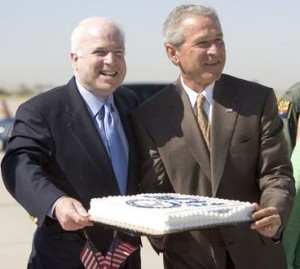
George W. and John McCain share birthday cake in Arizona as Katrina hits New Orleans, 2005
One of the Republican Party’s key tenets — indeed, one of its mantras — for decades has been “smaller government.” Recall Republican President Ronald Reagan‘s 1986 speech, where he stated:
The nine most terrifying words in the English language are, ‘I’m from the government and I’m here to help.’
In recent weeks, however, Republicans have been calling for all kinds of Big Government:
1. ISIS
Many Republicans are calling for another all-out U.S. war, complete with “boots on the ground,” against ISIS in Iraq and in Syria as well. Such a massive military operation is of course the antithesis of “smaller government.” Note that, when it comes to the military-industrial complex and the idea of permanent war for the U.S., with all those fat government contracts going to defense contractors, Republicans love their Big Government.
2. The Secret Service
After several incidents during the past six years where Secret Service agents and management fell down on the job, the Republican-led House Committee on Oversight and Government Reform held a hearing last week. Some Republicans at the hearing called for solutions and reforms that sounded a lot like Big Government. These suggestions included: raising or beefing up the fence around the White House, a more advanced alarm system, more advanced electronic door locks, etc.
Ironically, however, it was the Republican “smaller government” philosophy, leading to their 2013 Sequestration cuts, that have caused the Secret Service to be short some 550 agents from its optimal level, which in turn may have led to some of the very problems which required last week’s special hearing. And the same thing happened recently regarding the influx of child refugees at the U.S. border with Mexico, with the Republicans once again calling for more Big Government solutions after previously cutting funding for border security and reducing the number of Border Patrol agents pursuant to the Sequestration. Ditto for Benghazi. See how this works?
3. Ebola
The Ebola crisis is spreading in some African countries because those countries do not have First World government assets like an advanced health care system and good sanitary conditions and practices. That’s why, thankfully, there is little danger of Ebola becoming a large-scale problem in the U.S. But that has not stopped Republicans from trying to make political hay out of Africa’s Ebola crisis, by claiming that President Obama hasn’t done enough to address the issue (even though there have been only a few cases of Ebola in the U.S. and none of them fatal) and suggesting — you guessed it — Big Government steps such as travel bans.
Yet once again, Republican budget cuts resulting from their “smaller government” philosophy may be playing a role in our ability to respond to the Ebola crisis in Africa and individual cases in America. House Republicans cut funding for the Centers for Disease Control starting in 2011, and even tried to cut President Obama’s recent funding plan to fight Ebola at the same time they are trying to criticize President Obama for not doing enough to fight the potential spread of Ebola in the U.S.
It should also be noted that the same Republican anti-government philosophy almost left the United States with no Affordable Care Act, which, since its passage, has covered at least 10.3 million more Americans with health insurance. Imagine some of those 10.3 million people walking around today with Ebola symptoms and unable to go to the doctor because they were not covered by the ACA and could not afford to do so. Actions have consequences indeed.
So what’s happening here with Republicans calling for Big Government in these high-profile cases? It’s the problem Republicans have when their anti-government philosophy (used in large part to justify massive tax cuts for their wealthy benefactors) runs into reality. We saw that conflict happen time and again during the presidency of George W. Bush. As Hurricane Katrina hit millions of Americans in the Gulf states, Bush strummed a guitar at a fundraiser in California and shared a birthday cake with Senator John McCain in Arizona. Afterward, Bush flew over the Katrina devastation from a detached height of tens of thousands of feet. “I’m from the government and I’m here to help” is precisely what many Americans wanted to hear at that moment, but did not. Bush’s approval began a long slide after Katrina, and you can bet that Bush’s fellow Republicans took notice. Likewise, Bush’s laissez-faire attitude toward the housing and financial markets let greedy, unscrupulous traders run amok with little or no regulation, leading to the largest U.S. financial and economic collapse since the Great Depression, which, not coincidentally, was the last time the U.S. implemented the Republican idea of pulling the government back so corporations could have free reign over us.
Although Republicans won’t admit that their “smaller government” philosophy is a wholesale failure and that a healthy diet of “good government” is needed to run a big complex country like America, just keep an eye on the GOP’s reactions to individual situations and issues (as well as the elections calendar) for a clue as to what Republicans really think is popular with most Americans.
Photo by Infrogmation, used under Creative Commons license. https://www.flickr.com/photos/infrogmation/2993173955/


